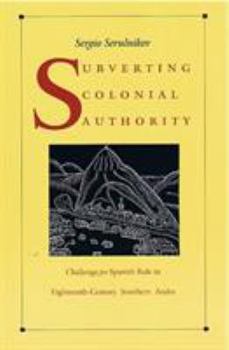Subverting Colonial Authority: Challenges to Spanish Rule in Eighteenth-Century Southern Andes
Select Format
Select Condition 
Book Overview
This innovative political history provides a new perspective on the enduring question of the origins and nature of the Indian revolts against the Spanish that exploded in the southern Andean highlands in the 1780s. Subverting Colonial Authority focuses on one of the main--but least studied--centers of rebel activity during the age of the Túpac Amaru revolution: the overwhelmingly indigenous Northern Potosí region of present-day Bolivia. Tracing how routine political conflict developed into large-scale violent upheaval, Sergio Serulnikov explores the changing forms of colonial domination and peasant politics in the area from the 1740s (the starting point of large political and economic transformations) through the early 1780s, when a massive insurrection of the highland communities shook the foundations of Spanish rule. Drawing on court records, government papers, personal letters, census documents, and other testimonies from Bolivian and Argentine archives, Subverting Colonial Authority addresses issues that illuminate key aspects of indigenous rebellion, European colonialism, and Andean cultural history. Serulnikov analyzes long-term patterns of social conflict rooted in local political cultures and regionally based power relations. He examines the day-to-day operations of the colonial system of justice within the rural villages as well as the sharp ideological and political strife among colonial ruling groups. Highlighting the emergence of radical modes of anticolonial thought and ethnic cooperation, he argues that Andean peasants were able to overcome entrenched tendencies toward internal dissension and fragmentation in the very process of marshaling both law and force to assert their rights and hold colonial authorities accountable. Along the way, Serulnikov shows, they not only widened the scope of their collective identities but also contradicted colonial ideas of indigenous societies as either secluded cultures or pliant objects of European rule.
Format:Paperback
Language:English
ISBN:0822331462
ISBN13:9780822331469
Release Date:September 2003
Publisher:Duke University Press
Length:287 Pages
Weight:1.00 lbs.
Dimensions:0.7" x 6.0" x 9.1"
Customer Reviews
0 rating





